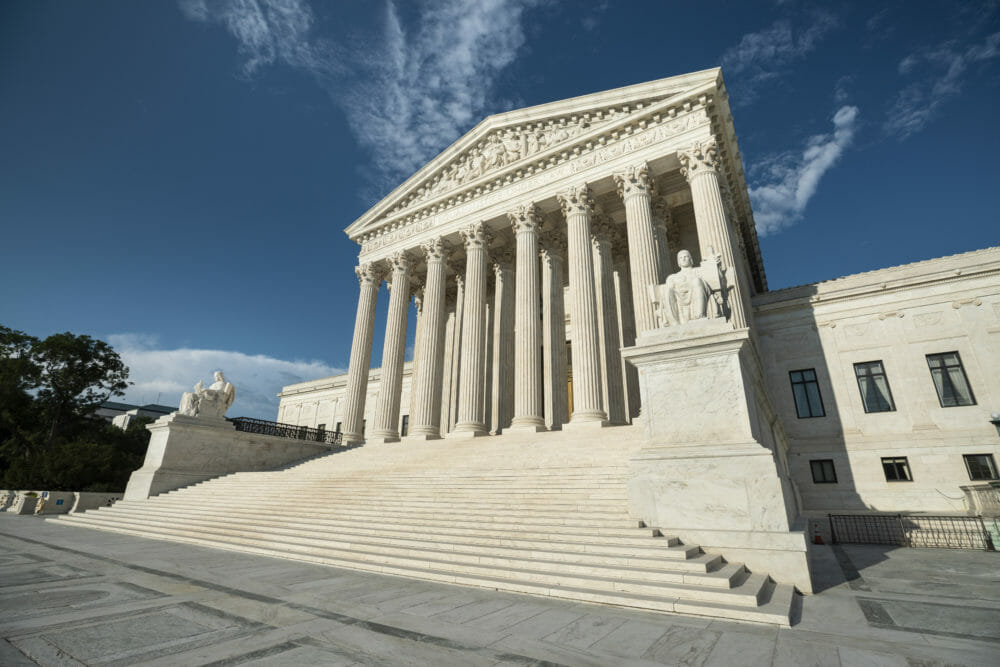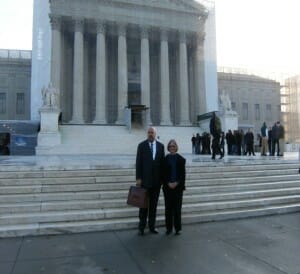Gary Lynch Appointed To Executive Committee In Target Data Breach MDL
On May 22, 2014, a federal district judge issued an order appointing Gary Lynch to serve on the five-person Executive Committee responsible for overseeing the prosecution of nationwide litigation against Target Corporation. All cases stemming from the data breach which the retailer experienced in late 2013 have been consolidated before U.S. District Judge Paul A. Magnuson in the District of Minnesota. Lynch Carpenter was initially retained by numerous financial institutions which suffered damages as a result of measures the institutions were forced to take to protect their account holders from suffering identity theft and financial loss. The Executive Committee will work in conjunction with lead and liaison counsel to coordinate the litigation on behalf of both consumers and financial institutions.
The case is In re: Target Corporation Customer Data Security Breach Litigation, MDL No. 2522 in the U.S. District Court for the District of Minnesota.
Gary Lynch Quoted In Wall Street Journal Risk Compliance Journal On Target Data Breach Litigation
In February of 2014, Lynch Carpenter filed multiple class action lawsuits against Target Corporation on behalf of credit unions who suffered injury as a result of the security breach compromising Target store customers’ names, credit and debit card numbers, card expiration dates, personal identification numbers, and card verification values. The cases are currently pending in the United States District Court for the Western District of Pennsylvania. Lynch Carpenter founding partner Gary F. Lynch was recently quoted in the Wall Street Journal Risk & Compliance Journal regarding the suits.
US Supreme Court Hands Down FLSA Pick Off Opinion Genesis Healthcare Corp. v. Symczyk
On April 16, 2013, the United States Supreme Court decided Genesis Healthcare Corp. v. Symcyzk, a case in which Gary F. Lynch served as Counsel of Record on behalf of Respondent Laura Symczyk. In a 5-4 decision, the Court held that a collective action under the Fair Labor Standards Act (“FLSA”) is not justiciable and may not proceed when the lone plaintiff’s individual claim becomes moot.
The FLSA authorizes a private cause of action against employers violating certain FLSA provisions. 29 U.S.C. § 216(b). Employees may sue on their own behalf and on behalf of “other employees similarly situated.” Id. Respondent, a registered nurse, brought such a “collective action,” alleging that petitioners, her former employers, violated the FLSA by deducting a 30-minute unpaid meal break from each shift even if the employee worked during that time. Petitioners made Respondent an offer of judgment under Federal Rule of Civil Procedure 68: $7,500 for alleged unpaid wages and reasonable attorneys’ fees, costs and expenses. When Respondent failed to respond to the offer, Petitioners moved to dismiss for lack of subject-matter jurisdiction, arguing that their offer of complete relief rendered Respondent’s FLSA claim moot. Noting that no other employees had yet joined Respondent’s suit, the district court agreed with Petitioners and dismissed the suit. The Third Circuit reversed. Although recognizing that Petitioners had offered complete relief, thus mooting the individual FLSA claim, the appellate court held that using strategic Rule 68 offers to “pick off” aggrieved employee-plaintiffs would frustrate the FLSA’s collective-action process. The Third Circuit therefore remanded for the Respondent to seek conditional certification, which, if successful, would relate back to the date of the Complaint.
The Supreme Court reversed. The Court refused to decide whether the unaccepted Rule 68 offer actually mooted Respondent’s individual FLSA claim, instead simply noting that the two lower courts agreed that it did and that Respondent waived the argument. The only question, then, was whether Respondent’s suit remained justiciable based on the collective-action allegations she raised. The Court held that it did not because “the mere presence of [such] allegations in the complaint cannot save the suit from mootness once the individual claim is satisfied.” Because Respondent’s claim was mooted before any other employees had joined, she had no “personal interest in representing putative, unnamed claimants, nor any other continuing interest that would preserve her suit from mootness.” In applying these “well-settled mootness principles,” the Court explicitly distinguished its Rule 23 precedent – on which Respondent had relied – as legally and factually inapposite. Although the Rule 68 offer prevented additional claimants from seeking relief in Respondent’s suit, the Court reasoned, those claimants “are no less able to have their claims settled or adjudicated following Respondent’s suit than if her suit had never been filed at all.”
Justice Thomas delivered the opinion for the Court, in which Chief Justice Roberts and Justices Scalia, Kennedy, and Alito joined. Justices Ginsburg, Breyer, and Sotomayor, led by Justice Kagan, delivered a spirited dissent both as to what the majority did and did not decide. The dissent did not find the distinctions between collective and class actions sufficient to warrant limiting the relation-back doctrine to traditional class actions. Indeed, to do so, the dissent explained, would allow defendants to short-circuit collective actions and frustrate the objectives of the FLSA. The dissent also disagreed with the majority’s choice to evade ruling on the impact of an unaccepted Rule 68 offer of judgment. It considered this issue to be “inextricably intertwined” with the issue the majority did address, making both appropriate for the court’s consideration.
Justice Kagan focused her dissent on arguing that an unaccepted Rule 68 offer could never moot an individual claim. She relied upon traditional contract principles, arguing that an unaccepted offer of judgment, like any withdrawn offer, is a “legal nullity” that cannot moot a case. She also grounded the dissent in Rule 68 itself, stressing that it permits entry of judgment, thus mooting the plaintiff’s claim, only when the offer is accepted. If the offer is not accepted, the offer is deemed withdrawn, so a live controversy does – and always will in those circumstances – remain. The majority, as noted above, did not weigh in on this latter question, i.e., whether a case becomes moot after an unaccepted Rule 68 offer of full relief. Should the issue be brought before the Court, one can only speculate as to how a majority of the court would resolve it.
“We are disappointed in the Court’s decision, but we see this as an extremely narrow opinion that will have little effect on future FLSA cases,” said Gary F. Lynch of Lynch Carpenter LTD., who represented Symczyk. “Ironically, the Court closed the courthouse doors in front of Laura Symczyk on mootness grounds, despite the fact that she has never been and now never will be compensated for her stolen wages,” Lynch said. “This procedural oddity, while fundamentally unfair to Ms. Symczyk, limits the application of this opinion.”
As one commentator observed: “This 5-4 decision is best described by Justice Kagan in her dissenting opinion as ‘wrong, wrong and wrong again.’ A case where a plaintiff never accepted an employer-defendant’s offer of judgment and the majority concludes not only is her claim ‘moot,’ but anyone who may be similarly situated with a FLSA claim is also ‘moot?’ Furthermore, as Justice Kagan correctly stated, ‘the majority’s decision – founded as it is on an unfounded assumption – would have no real-world meaning or application. The decision would turn out to be the most one-off of one-offs….That is the case here.’ Justice Kagan (joined by Justices [Ruth Bader] Ginsburg, [Stephen] Breyer and [Sonia] Sotomayor) correctly conclude that today’s opinion in Genesis has virtually no practical application to the practice of law in the FLSA arena.”
United States Supreme Court To Decide Whether Settlement Offer Can Moot FLSA Suit
Gary F. Lynch and Laura Symczyk on the steps of the United States Supreme Court
On December 3, 2012, the United States Supreme Court heard argument in Genesis v. Symczyk, a case in which Gary F. Lynch served as Counsel of Record on behalf of Respondent Laura Symczyk.
Case Background: Between April and December of 2007, Laura Symczyk worked as a Registered Nurse at a healthcare facility in Philadelphia. In December, 2009, Lynch Carpenter initiated a putative collective action on behalf of Ms. Symczyk and all similarly situated individuals in the Eastern District of Pennsylvania against the facility owners, Genesis HealthCare Corporation and ElderCare Resources Corporation. Ms. Symczyk alleged that Genesis violated Section 216(b) of the Fair Labor Standards Act (“FLSA”) by automatically deducting meal break time from the pay of certain employees, including her, regardless of whether the employees actually performed compensable work during their breaks.
In February, 2010, Genesis served Ms. Symczyk with an offer of judgment under Federal Rule of Civil Procedure 68 in the amount of $7,500 for her alleged unpaid wages. Ms. Symczyk did not accept the offer.
In March, 2010, Genesis filed a motion to dismiss the lawsuit for lack of subject matter jurisdiction. The district court tentatively granted the motion in May, 2010, finding that Genesis’s offer mooted the collective action, which no one other than Ms. Symczyk had yet joined. The court accepted Genesis’s argument that Ms. Symczyk effectively rejected its offer by failing to respond within the 14 days permitted under Rule 68, and that Ms. Symczyk, as the lone plaintiff, no longer had a personal stake or legal interest in the case, necessary for the court’s subject matter jurisdiction under Article III of the Constitution.
On appeal, Mr. Lynch, arguing on behalf of Ms. Symczyk, convinced the United States Court of Appeal for the Third Circuit to reverse the decision of the district court. The Third Circuit agreed with Lynch Carpenter’s argument, finding that Ms. Symczyk was entitled to move for conditional certification of her collective action before Genesis could moot the case through an offer of judgment. The Third Circuit reasoned that it would be unfair and inefficient to allow defendants to prevent the formation of collective actions by “picking off” plaintiffs with offers of judgment before they could move for certification.
After the Third Circuit denied rehearing, Genesis appealed to the United States Supreme Court. The Supreme Court granted certiorari on June 25, 2012 to determine whether a collective action brought under Section 216(b) of the FLSA becomes moot when the lone plaintiff receives a complete offer of judgment from the defendant under Rule 68 before any other potential plaintiffs have joined the case. To assist with the Supreme Court appeal, Mr. Lynch assembled a team of Supreme Court specialists, including Neal Kumar Katyal, former Acting Solicitor General of the United States, and Adina Rosenbaum of Public Citizen Litigation Group.
The High Court Hears Argument: The United States Supreme Court heard oral arguments in the case at 10:00 a.m. on Monday, December 3, 2012. Genesis’ lawyer, Columbia professor Ronald J. Mann, faced tough questioning from the outset from Justices Ruth Bader Ginsburg, Sonia Sotomayor, and Elena Kagan, and he did not help his client’s cause by dismissing the question of taking care of Ms. Symczyk’s co-workers as “a housekeeping issue” for the courts. Early in the argument, it appeared that the women on the bench were sympathetic not only to Ms. Symczyk, but also to her co-workers, all of whom had been docked thirty minutes of pay per shift for lunch breaks that most simply were unable to take.
Although Mann insisted that Genesis had been willing to pay the entire $7,500 that it figured it owed Ms. Symczyk, his comments did not seem to reassure Justices Ginsburg and Sotomayor, both of whom questioned whether Genesis was surreptitiously trying to avoid liability for Ms. Symczyk’s co-workers, or Justice Kagan, who candidly stated that Ms. Symczyk herself wound up with “nothing.” That, Justice Kagan said, was scarcely merely “a housekeeping issue.” Justice Ginsburg also accused Genesis of failing to give the district court an opportunity to address the co-workers’ claim, rushing in to thwart it at the first chance.
The professor, it seemed, was getting nowhere in his efforts to convince Justices Ginsburg, Sotomayor, and Kagan that Ms. Symczyk could not “take yes for an answer.” These three Members of the Court perceived an obvious injustice, both in Ms. Symczyk’s own loss, and in what they seemingly viewed as lawyerly manipulation of the case to get it out of court for little more than $7,500 and attorney’s fees.
Justice Antonin Scalia briefly sought to come to Mann’s rescue, proposing an argument that the professor had not made at the lectern, i.e., that Ms. Symczyk perhaps did not have standing to make a case, for herself or her co-workers, because she could have accepted Genesis’ offer, but did not.
When Washington attorney Neal Kumar Katyal took his turn on behalf of Ms. Symczyk, the Court’s conservatives then took theirs. First, Chief Justice John G. Roberts, Jr., questioned whether Ms. Symczyk had adequately preserved her argument that an unaccepted settlement offer can never make a lawsuit moot. Justice Sotomayor then got involved again, reinforcing Mr. Katyal’s points by asking him to acknowledge that at no time had Ms. Symczyk accepted the pay-off offer, nor had she ever conceded that the offer was adequate.
Chief Justice Roberts, joined by Justice Scalia, then challenged Mr. Katyal on various procedural issues. Once more, however, Justices Sotomayor and Ginsburg entered, this time to debate those very points. The Chief Justice returned with a suggestion that, with none of Ms. Symczyk’s co-workers formally in the case at the time Genesis made its offer, there were no other parties whose interests the judge could weigh. Mr. Katyal countered that it would make no sense to have a case filed in part on behalf of Symczyk’s co-workers, only to be impeded before there was any opportunity to discern whether any of those employees wished to join the suit. Moreover, Mr. Katyal told Justice Scalia, there was no motive for workers bringing a collective overtime action to delay pursuit of the case, “because the clock is literally ticking.”
Justice Kennedy entered the argument at that point to question Mr. Katyal as to whether the co-workers would have objected if the lower court judge had had an opportunity to rule that the offer to Ms. Symczyk was full relief that had to be enforced. Mr. Katyal replied that Ms. Symczyk had requested a fairness hearing concerning the adequacy of the offer, but never got it. In any event, he added, “an offer that never gave Ms. Symczyk anything is one that didn’t make her whole.”
Ms. Symczyk’s legal team received support from Assistant to the U.S. Solicitor General Anthony A. Yang. The federal government participated in the case to make the argument that, if a settlement offer is not actually accepted, there is no basis for ending the case as moot. “Respondent has never been compensated for her individual damage claim, nor has she received a court judgment favorably adjudicating that claim,” Yang told the court. “It follows that her individual claim remains live, as does this collective action.”
Following argument, Lynch Carpenter partner Gary F. Lynch, lead counsel for Ms. Symczyk, stated that he was encouraged by the questioning of the Justices, and that he remains hopeful that the Court will issue a decision which will serve to protect collective action mechanism under the FLSA from being undermined by early offers of judgment to the named plaintiff or plaintiffs.
Click Here to Access the United States Supreme Court Docket for this Case (Opens in a new window)






